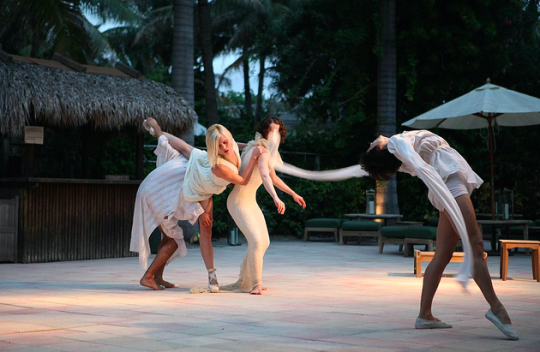NYFA Source: Travel Grant Tips and Opportunities
“Making an argument for why this trip will have a positive impact on the career of the emerging artist in question is also very important.”
To many artists, applying for grants is a difficult process. It involves filling out dozens of applications and writing endless proposals. It’s a fact, seeking funding can be a laborious task. But don’t despair, all that hard work pays off. Being awarded money can make a huge difference in sustaining your career as an artist and travel grants offer a unique opportunity to develop your creative practice.
Each year thousands of artists apply for travel grants. The goals for funding vary, some want to mount productions internationally and others may want to workshop performances in front of new audiences. Travel grants assist with a variety of costly expenses, such as transportation and accommodations. Foundations tend to select projects that show a commitment to artistic integrity, demonstrate craft, and encourage innovation.
Without question, these grants are highly competitive and often recognize artists who have made noteworthy progress. So, how do you make your application stand-out? This article will provide information about the process of applying for travel grants, including insight from the Jerome Foundation and a list of funding organizations via NYFA Source. Take the first step to strengthening your proposal and completing a successful travel grant application
Tips for applying to Travel Grants
1.) Read the Guidelines
The guidelines describe the grant’s criteria, rules, and how to apply. Read them carefully and gain a full understanding of what the funder is looking for. Before moving forward with an application, you should ask yourself the following:
- Am I eligible to apply for this travel grant?
- What is this funder looking for in applicants?
- Have I assessed the full cost of the project?
- If I do receive the funding, can I meet the requirements of the grant?
Answering these questions will help you organize your proposal and consider what details are significant to your proposal. Some grants offer early stage feedback and critiques, which you should take advantage of if possible.
In addition, If you’re looking to build your body of work, travel grants are extremely useful. You can spend time building connections with new cultural organizations and/or use the experience abroad to develop your talents in a new environment. You’ll want to highlight all of these benefits in your application.
2.) Do your Research
Before you apply, make sure you have done your homework: know the organization, choose an excellent project to pursue, and equally important, read the funder’s mission statement.
Take time to research the funder and study the projects they’ve supported in the past. Are there certain patterns in the projects they select? This research can help you understand the organizational culture and funder expectations.
Funders are looking for innovative and well-defined projects. Your proposal should be presented in a clear manner and follow the guidelines detailed in the application precisely. Remember, travel grants provide a bridge between artists and the wider community and give you the opportunity to showcase your artistic practice and/or workshops ideas with new audiences. The process of applying can also require you to document your work and allow for self-reflection, which can be valuable for your creative process.
3.) Make a Plan
According to Jeremy Meckler of the Jerome Foundation, promising applications tend to have succinct and comprehensive plan.
“While quality of artwork and career stage are important elements for panels, the completeness of planning is often more important. We ask for a travel budget, letters of confirmation, and as detailed a plan as possible and those are all very important elements of the Travel and Study Grant application. Panels want to know that the proposed trip will actually happen, and showing detailed plans is the best way to ensure that. And of course making an argument for why this trip will have a positive impact on the career of the emerging artist in question is also very important.”
You must include enough detail to convince them you’re the best person for this opportunity. Your artist statement. A detailed budget. Photographs. Past research. A thorough plan is the most important factor and will ultimately, determine your applications success.
4.) Remember, this is a travel grant. Not a project grant.
There are clear distinctions between travel grants and project grants. Again, reading the guideline is vital to avoiding mistakes. For example, the Jerome Foundation’s Travel and Study Grant Program awards grants directly to emerging artists. No production support is provided through this program. They do, however, have a general grant program that supports production, but that program requires a fiscal sponsor. Each grant has specific rules and eligibility requirements. Be mindful and explain what you want to accomplish with the funding.
5.) Be Original
Find ways to explain your project concisely, share the value of your artwork and provide honest reflections of your practice. Focus your artwork at the center of your proposal. This is your opportunity to offer your perspective and engage the reviewer. The proposal should clearly demonstrate why the funding will support your overall goals. Every detail you include should be explicitly tied to the mission of your project.
6.) Get Feedback
If you are still unsure about whether your project is a fit or have questions that are not answered in the guidelines, email or call the organization for feedback. Organizations are available to help you determine if your work meets the funding criteria prior to preparing the proposal. Remember, give yourself plenty of lead time to contact individuals and get detailed feedback. Then incorporate their recommendations in your applications.
7.) Meet the deadline
Applications are due by the following deadlines. No exceptions. It may seem obvious, but many applications are rejected because they miss the deadline or fail to adhere to instructions.
Travel Grants in NYFA Source
Theatre Communications Group
Global Connections offers funding in two different categories: On the Road, travel grants of up to $5,000 each; In the Lab, project development grants of $10,000 each. These grants support geographically unrestricted travel to foster international collaborations between US-based artists and their creative colleagues around the world.
Association of Performing Arts Presenters
The Cultural Exchange Fund is a travel subsidy program supported by the Andrew W. Mellon Foundation to assist U.S. based presenters in building partnerships and collaborations with international touring artists, companies and their collaborators and in seeing the work of artists from around the world in its cultural context.
Mid Atlantic Arts Foundation
USArtists International supports performances by American artists at important cultural festivals and arts marketplaces around the globe. Through USAI, grants are available to American dance, music and theater ensembles and solo performers that have been invited to perform at international festivals and engagements.
New England Foundation for the Arts: NEFA
The Presenter Travel Fund provides monetary assistance to arts programmers or curatorial staff in New England. Applicants may apply for funding to help cover the expense of attending festivals, showcases, conferences, or other cultural events where they can see artistic work that they may present in their own community.
The Jerome Foundation
The Jerome Foundation makes grants to support the creation and production of new artistic works by emerging artists, and contributes to the professional advancement of those artists. The travel grant is open to residents of Minnesota and New York City.
European Cultural Foundation
STEP Beyond Travel Grants are open to US applicants living in Europe. The travel grant supports cultural expression and aim to connect people with cultural ideas and policies in Europe.
Travel grants can help artists build a greater body of work and gain experience in showcasing their work. A majority of travel grants will be listed under the award category in NYFA Source. Make sure to read the Description of Program; along with the Selection Process/Criteria as you search the database.
– Glory Edim, Program Associate, Online Resources
Find more grants for artists on NYFA Source, a free searchable database of 12,000+ awards, residencies, and services.
Image: Orit Ben-Shitrit (Fellow in Video/Film ‘12)





